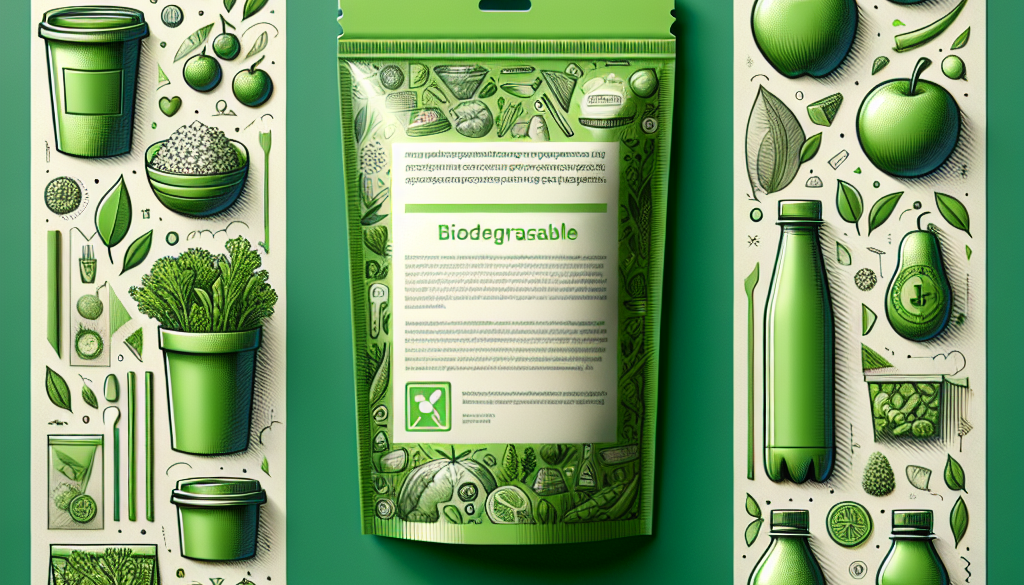Redefining Eco-friendly Food Packaging
-
Table of Contents
- Eco-Friendly Food Packaging: Revolutionizing Sustainability in the Food Industry
- The Urgency for Sustainable Food Packaging
- Innovations in Eco-Friendly Food Packaging Materials
- Challenges and Considerations in Implementing Sustainable Packaging
- Case Studies: Success Stories in Sustainable Food Packaging
- Conclusion: The Future of Food Packaging is Green
- ETprotein: Leading the Way in Sustainable Protein Products
Eco-Friendly Food Packaging: Revolutionizing Sustainability in the Food Industry

The food packaging industry is undergoing a significant transformation as sustainability becomes a priority for consumers and businesses alike. With the increasing awareness of environmental issues, there is a growing demand for eco-friendly food packaging solutions that are not only functional but also kind to the planet. This article delves into the innovative approaches and materials redefining eco-friendly food packaging, offering valuable insights and statistics to underscore the importance of this shift.
The Urgency for Sustainable Food Packaging
Traditional food packaging has relied heavily on plastics and other materials that are detrimental to the environment. The statistics are alarming: according to a report by the United Nations Environment Programme, around 300 million tons of plastic waste are produced every year, a significant portion of which comes from packaging. Moreover, the Ellen MacArthur Foundation predicts that by 2050, there could be more plastic than fish in the oceans by weight if current trends continue.
These figures highlight the urgent need for sustainable alternatives in food packaging. Consumers are increasingly aware of the environmental impact of their choices, with a Nielsen study revealing that 73% of global consumers would change their consumption habits to reduce their environmental footprint. This consumer demand is driving the food industry to seek out and implement eco-friendly packaging solutions.
Innovations in Eco-Friendly Food Packaging Materials
The quest for sustainable packaging has led to the development of various innovative materials that are biodegradable, compostable, or made from renewable resources. Here are some of the most promising materials redefining eco-friendly food packaging:
- Bioplastics: Made from renewable resources like corn starch, sugarcane, and algae, bioplastics offer a reduced carbon footprint and are often biodegradable or compostable.
- Edible Packaging: Edible packaging made from natural food substances not only eliminates waste but also provides an additional eating experience.
- Plant-Based Packaging: Packaging derived from plant fibers such as bamboo, palm leaves, and coconut coir is gaining popularity due to its compostability and renewable nature.
- Mushroom-Based Packaging: Mycelium, the root structure of mushrooms, can be grown into custom shapes and is fully compostable, making it an excellent alternative to Styrofoam.
- Recycled Cardboard and Paper: Using recycled materials reduces the need for virgin resources and can be recycled again, creating a closed-loop system.
These materials are not only better for the environment but also align with consumer expectations for sustainable packaging options.
Challenges and Considerations in Implementing Sustainable Packaging
While the shift towards eco-friendly food packaging is necessary, it is not without its challenges. Key considerations include:
- Cost: Sustainable materials can be more expensive than traditional options, potentially impacting the final product price.
- Performance: Eco-friendly packaging must meet the same standards for food safety and shelf life as conventional packaging.
- Infrastructure: Adequate industrial composting and recycling facilities are required to handle new types of packaging materials.
- Consumer Education: Consumers need to be informed about how to properly dispose of eco-friendly packaging to ensure its environmental benefits are realized.
Despite these challenges, the benefits of sustainable packaging for the environment and for meeting consumer demand make it a worthwhile investment for the food industry.
Case Studies: Success Stories in Sustainable Food Packaging
Several companies have already made strides in adopting eco-friendly packaging:
- Loop: A shopping platform that uses reusable containers for a wide range of products, reducing single-use packaging waste.
- Alter Eco: A food company that uses compostable wrappers for its chocolate bars and truffles.
- Mushroom Packaging: Companies like Ecovative Design are using mushroom-based materials to replace plastic packaging in various industries, including food.
These examples demonstrate the feasibility and success of sustainable packaging initiatives in the food industry.
Conclusion: The Future of Food Packaging is Green
The redefinition of eco-friendly food packaging is an ongoing process that requires innovation, collaboration, and commitment from all stakeholders in the food industry. By embracing sustainable materials and practices, companies can not only reduce their environmental impact but also meet the growing consumer demand for responsible packaging. The future of food packaging is undoubtedly green, and the transition to more sustainable options is both a challenge and an opportunity for the industry.
ETprotein: Leading the Way in Sustainable Protein Products
In line with the sustainable practices discussed, ETprotein company’s protein products are an excellent choice for those seeking environmentally responsible food options. Their range of organic bulk vegan proteins and L-(+)-Ergothioneine (EGT) are produced with sustainability in mind, ensuring that consumers can enjoy high-quality protein without compromising the health of the planet.
ETprotein’s commitment to non-GMO, allergen-free products with a neutral taste makes them a perfect fit for eco-friendly food packaging initiatives. By choosing ETprotein, businesses can align their offerings with the latest trends in sustainability and cater to the conscious consumer.
About ETprotein:
ETprotein, a reputable protein and L-(+)-Ergothioneine (EGT) Chinese factory manufacturer and supplier, is renowned for producing, stocking, exporting, and delivering the highest quality organic bulk vegan proteins and L-(+)-Ergothioneine. They include Organic rice protein, clear rice protein, pea protein, clear pea protein, watermelon seed protein, pumpkin seed protein, sunflower seed protein, mung bean protein, peanut protein, and L-(+)-Ergothioneine EGT Pharmaceutical grade, L-(+)-Ergothioneine EGT food grade, L-(+)-Ergothioneine EGT cosmetic grade, L-(+)-Ergothioneine EGT reference grade and L-(+)-Ergothioneine EGT standard. Their offerings, characterized by a neutral taste, non-GMO, allergen-free attributes, with L-(+)-Ergothioneine purity over 98%, 99%, cater to a diverse range of industries. They serve nutraceutical, pharmaceutical, cosmeceutical, veterinary, as well as food and beverage finished product distributors, traders, and manufacturers across Europe, USA, Canada, Australia, Thailand, Japan, Korea, Brazil, and Chile, among others.
ETprotein specialization includes exporting and delivering tailor-made protein powder and finished nutritional supplements. Their extensive product range covers sectors like Food and Beverage, Sports Nutrition, Weight Management, Dietary Supplements, Health and Wellness Products, and Infant Formula, ensuring comprehensive solutions to meet all your protein needs.
As a trusted company by leading global food and beverage brands and Fortune 500 companies, ETprotein reinforces China’s reputation in the global arena. For more information or to sample their products, please contact them and email sales(at)ETprotein.com today.












